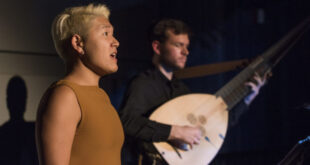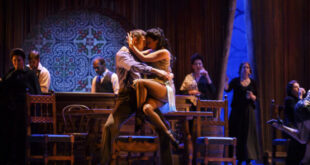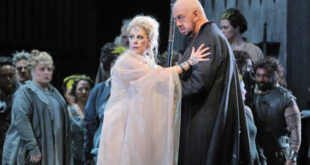 After the passing of Beethoven in 1827, Giuseppe Verdi was the greatest musical genius of the 19th century — a century filled with great composers. This is not merely an opinion. In fact, Verdi’s services were more in demand by far than those of any other composer, and he was paid more for his music than anyone else. Yet Verdi was not the same type of genius as Mozart or Donizetti, who could separate their art from their personal problems. These composers showed again and again that they could create music of a beautiful, optimistic or even humorous nature despite any bitter suffering that they might be enduring. Verdi was not like that. His dark moods often intruded on his creative spirit, and this can be induced from many of his works. When, at the apex of his creative power, he suffered from a vexing internal conflict, rather than let it ruin a piece as he had once before (“Un giorno di regno”), he worked the problem out in producing one of the most brilliant and beloved operas of all time — “La traviata.”
After the passing of Beethoven in 1827, Giuseppe Verdi was the greatest musical genius of the 19th century — a century filled with great composers. This is not merely an opinion. In fact, Verdi’s services were more in demand by far than those of any other composer, and he was paid more for his music than anyone else. Yet Verdi was not the same type of genius as Mozart or Donizetti, who could separate their art from their personal problems. These composers showed again and again that they could create music of a beautiful, optimistic or even humorous nature despite any bitter suffering that they might be enduring. Verdi was not like that. His dark moods often intruded on his creative spirit, and this can be induced from many of his works. When, at the apex of his creative power, he suffered from a vexing internal conflict, rather than let it ruin a piece as he had once before (“Un giorno di regno”), he worked the problem out in producing one of the most brilliant and beloved operas of all time — “La traviata.”
Nowadays, if a man and woman live together unmarried, no one even raises an eyebrow. But back in the mid-19th century, in a small town in Catholic Italy…? Verdi began living with the former prima donna Giuseppina Strepponi in Paris in 1848. Even by this time ,Verdi was recognized as the pre-eminent composer of Italian opera. He lived like a prince and could have made his home in any of the great capitals of Europe. But, because of his fondness for the land from which he had come, the composer decided to set up residence — with Strepponi — in his hometown of Busseto in 1849. This move caused an immediate and clamorous scandal.
Befitting the double standard about such things that had existed since Day One of civilization, Verdi himself, the hometown boy who made good, felt little of the sting from local public indignity. The same, however, could not be said for Strepponi, who had borne several illegitimate children from previous affairs — some with married men. She was targeted with such vehemence, that people would cross the street at her approach rather than walk on the same side as she did. She even had a difficult time of it in church — the pews around her were deserted, and it is said that some of the priests even prohibited her from taking Communion or making Confession. Nor could Verdi take her with him on his many trips to other cities to produce his operas. This situation bothered Verdi so much that in 1851 he moved his parents out of the nearby suburban villa of Sant’Agata that he had bought for them some years before, and brought Strepponi to live with him there, in the country, well beyond the prying eyes and wagging tongues of Bussetans.
Why didn’t Verdi marry her? There is absolutely no question that he loved Strepponi dearly. They lived together for almost 50 years, until her death. She was the only living soul from whom he would take even the slightest criticism about his music, and it is probable that she even partook in the creative process — indicating what sounded good and what would go over well with audiences. But in 1852, he was determined not to marry her — at least then. And at this very same time he was deep into adapting “La Dame aux camélias,” a play by Dumas about a man and woman living scandalously together — in the country — unmarried! As work progressed on the opera that would ultimately be called “La traviata” (literally, she who has gone astray), it is impossible for Verdi NOT to have been thinking about his current domestic situation. And the reason that Verdi did not make his arrangement with Strepponi legal can be found in the attitude of the opera’s father character, Germont.
In the opera, Germont (the hero-tenor’s father) begs the tragic heroine, Violetta, to leave Alfredo to avoid the chance of a scandal spoiling the upcoming marriage of Alfredo’s sister to a well-to-do young man. This father figure is the key to understanding Verdi’s personal dilemma. In real life, there was such a figure, Antonio Barezzi, a prosperous merchant of Busseto. This man had been Verdi’s great benefactor and supporter for years. Not only did he provide the funding for the young Verdi’s private composition lessons and living expenses in Milan, he gave the youth one of his four daughters, Margherita, for a wife. But when Verdi was on the threshold of success, Margherita died, followed within 18 months by the deaths of their two infant children.
Verdi felt so guilty about this that, when he met Strepponi, he was horribly conflicted between his new love, and his debt to Barezzi. Verdi was clearly afraid that marrying Strepponi would upset his relationship with Barezzi in some horrible unknown fashion. But his eagerness to compose “La traviata” suggests that he desperately wanted to face his problem head on. We can never know for sure, but is not the voice and ominous music of Germont in the great Act II duet, not (at least to Verdi) the voice of Barezzi? There is, however, a line of Violetta’s, set beautifully in the last act that is most telling:
“Suena pudica virgine,
Degli anni suoi sui flore,
A te donnase il core,
Sposa ti sia, lo vo’.”
(Someday you’ll learn to love again,
One who will give her heart to you,
Innocent, pure and worthy,
Then you should marry,
I want that.”
Verdi married Strepponi in 1859, and remained very close friends with Barezzi.
Lyric Opera is staging a new production of “La traviata” this season. It will be directed by Arin Arbus, with sets by Riccardo Hernandez (the setting is where it should be, in the mid 19th century). The principal singers are soprano Marina Rebeka, tenor Joseph Calleja and baritone Quinn Kelsey. The opera will be conducted by Massimo Zanetti.
 Fra Noi Embrace Your Inner Italian
Fra Noi Embrace Your Inner Italian







